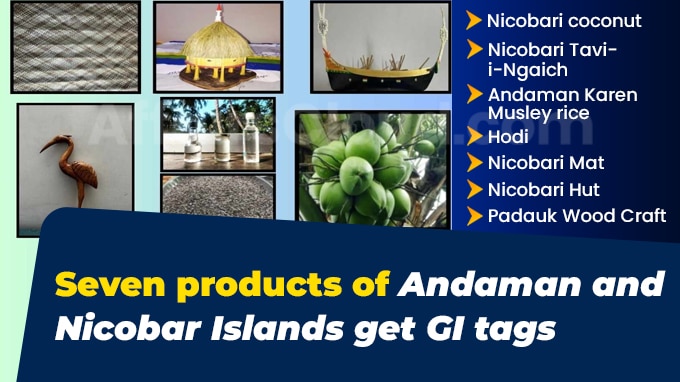 In December 2024, the Geographical Indications (GI) Registry in Chennai, Tamil Nadu (TN), under the Department for Promotion of Industry and Internal Trade (DPIIT), Ministry of Commerce and Industry (MoC&I), granted GI tags to seven indigenous and distinctive products from the Andaman and Nicobar(A&N) Islands, recognizing their cultural and traditional importance.
In December 2024, the Geographical Indications (GI) Registry in Chennai, Tamil Nadu (TN), under the Department for Promotion of Industry and Internal Trade (DPIIT), Ministry of Commerce and Industry (MoC&I), granted GI tags to seven indigenous and distinctive products from the Andaman and Nicobar(A&N) Islands, recognizing their cultural and traditional importance.
- The seven products are: Nicobari Mat (Chatrai-hileuoi), Nicobari Hut (Chanvi Pati – Nyi hupul), Nicobari Hodi craft, Padauk Wood Craft, Andaman & Nicobar Coconut, Nicobari Tavi-i-Ngaich (Virgin Coconut Oil) and Andaman Karen Musley Rice.
- This is the first time in the country that a single Union Territory ( UT) has been granted GI tags for seven products in a single instance.
Note: As of December 31,2024 India has a total of 658 registered GI tags
Key Points:
i.This achievement was made possible through the collaborative efforts of the regional office of National Bank for Agriculture and Rural Development (NABARD) in Vijayapuram(Andhra Pradesh, AP), along with various stakeholders.
ii.Several local organisations, including The Tribals Development Cooperative Society Limited, Sahara Women’s Marketing Cooperative Society Ltd., Tribal Development Council, and the Centre for Participatory Training and Learning, contributed significantly to securing the GI tags.
iii.The initiative was coordinated by the Human Welfare Association(HWA) under the guidance of Padma awardee Rajani Kant, also known as “the GI Man of India.”
7 New GI Products:
| GI Product | Goods Type |
|---|---|
| Nicobari mat (Chatrai-hileuoi) | Handcrafts |
| Nicobari Hut (To Chanvi Pati-Nyi hupul) | |
| Nicobari Hodi craft | |
| Padauk Wood Craft | Furniture |
| Nicobari Tavi-i-Ngaich (virgin coconut oil) | Oil |
| Andaman Karen Musley rice | Crop |
| Andaman & Nicobar coconut | Plant |
Overview of New GI Products:
i.Nicobari mat (Chatrai-hileuoi): The Nicobari mat is a significant cultural artefact made from sun-dried screw pine leaves. Used for sleeping, sitting, and during festivals.
- Nicobari mats are available only in the selected Andaman emporiums and markets.
ii.Nicobari Hut: These huts are made from locally sourced materials such as cane, sticks, and planks, with roofs crafted from cane leaves, grass, or other durable leaves.
- Its round, dome-shaped design offers stability, efficient airflow, and temperature regulation.
iii.Nicobari Hodi Craft: Hodi is a traditional outrigger canoe of the Nicobari tribe, used in the Nicobar Islands. Built using local trees or materials from nearby islands, the design of each hodi varies by island.
iv.Padauk Wood Craft: Padauk furniture is made locally in the Andamans using ornamental Padauk wood. It has a low carbon footprint as the wood waste is fully recyclable
v.Nicobari Tavi-i-Ngaich (virgin coconut oil) : Virgin coconut oil is a pure and natural product, indicating no chemical processing or oxidation. It is made from fresh coconut meat, coconut milk, or its residue, without any added chemicals.
vi.Andaman & Nicobar Coconut : Coconut plants grow in the coastal areas of the Andaman and Nicobar Islands, with the Nicobar Islands being a key source of coconut genetic diversity.
- The plant is crucial to the islands’ ecology, economy, and cultural traditions.
vii.Andaman Karen Musley rice: Musley rice is a traditional food crop of the Andaman Islands, cultivated by the Karen community for generations. Over 50% of the rice fields in the islands still grow traditional varieties.
Note: As of December 2024, India has recorded 1,408 GI filings, of which 658 have been registered, positioning the country as a global leader in recognising and protecting unique products linked to specific geographies.
About Geographical Indications (GI) Registry:
Headquarters – Chennai, Tamil Nadu(TN)
Established – 2003




